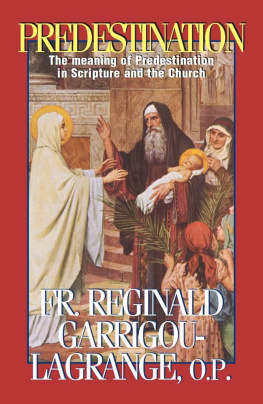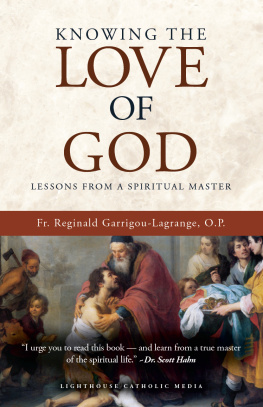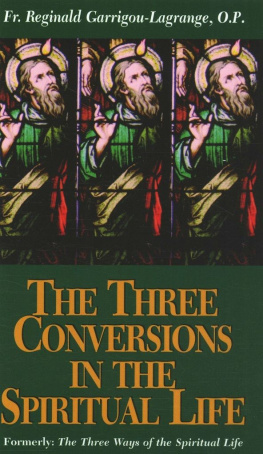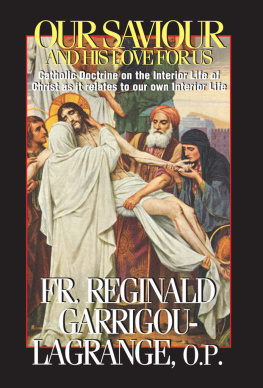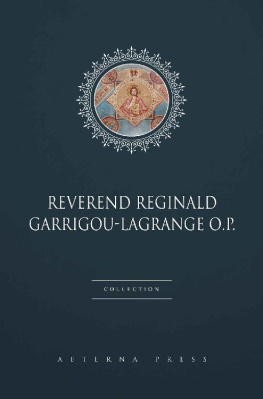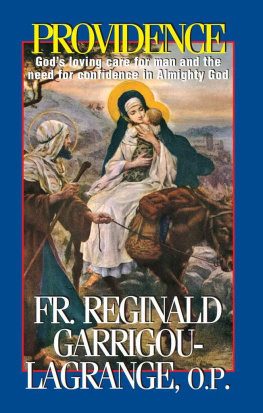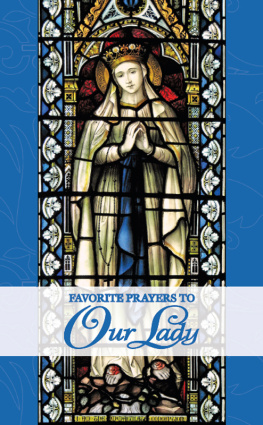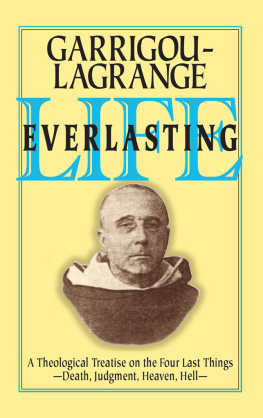Predestination
Fr. Reginald
Garrigou-Lagrange
O.P.
Copyright 1998, Fr. Reginald Garrigou-Lagrange O.P.
To
The Holy Mother of God
Mother of Divine Grace
as a
Token of Gratitude and
Filial Obedience
PREFACE
IN two works The purpose of the present work is to give substantially and in compact form the result of those labors. St. Augustine's phrase, "The predestination of the saints," reminds us that predestination to grace alone, which does not in fact bring us to eternal life, is not in the true sense predestination, since this latter includes the gift of final perseverance.
In the first part of this book our studies will be concerned with the meaning of predestination according to Scripture and the teaching of the Church. Then we shall consider the principal difficulties of the problem, the method to be followed, the classification of the theological systems, and the stand taken by St. Augustine.
In the second part we shall give the history of the various solutions of the great problem, insisting upon the teaching of St. Thomas, which we shall compare with the tentative solutions proposed by theologians of later date, and especially with the solutions proposed by the post-Tridentine theologians.
In the third part we shall treat of grace, especially of efficacious grace, by which the effects of predestination are realized in this life. These are vocation, justification, and merit. We shall make a special study of efficacious grace in its relation to sufficient grace that is offered and even given to all.
The scope of this book from beginning to end is the reconciliation of the two principles of divine predilection and possible salvation for all. On the one hand, "no one thing would be better than another, if God did not will greater good for one than for another." On the other hand, God never commands what is impossible, but makes it possible for all who have come to the use of reason to fulfil the precepts that are of obligation, at the time they are of obligation, when and as these are known by them.
The intimate reconciliation of these two principles is beyond our power of perception. Before our admission to the beatific vision, this would be impossible for any created intellect, either angelic or human. But we must attach equal importance to both principles. They counteract each other, and the history of theology as well as a thorough knowledge of the teaching of St. Thomas, enables us to estimate each principle at its true value, so that we vaguely foresee how infinite mercy, justice, and sovereign liberty are intimately reconciled in the eminence of the Deity, or of the intimate life of God.
It will serve a useful purpose to study these great questions again at the present time, all the more so as people today very often are not aware of the reality and value of divine grace; for without it we can do nothing in the way of saving our souls. The eternal reality of the problem studied in these pages becomes more strikingly evident from the light thrown on it by the following reflections taken from the fine book recently published by a friend of ours.
"There are thus two movements in the Christian world. The movement by which it ascends to God is but the result of the movement by which God descends into it, and this is the first movement. And the more it yields to this movement by which God gives Himself to it, the more the movement is awakened in it by which it gives itself to God. For grace has a vivifying effect, and is not, as Luther thought, a mantle cast over a dead person. The creature, profoundly stirred to act, arises from sleep and becomes all vigilance and activity. In its final stage this activity is one of pre-eminence, of loving contemplation, and of superabundance. But at the same time it is also a moral, ascetic, practical, and militant activity....
"A time came when man took this second movement for the first. In the age of anthropocentric humanism, which is Pelagianism in action, man forgot that God is the first Mover in the act of love, as He is the first Cause of being. Man acted as if the creature owed its advancement to itself and not to the operation of the divine plenitude in it. When these conditions prevailed, the Christian world, laboring under the triple ferment of the Renaissance, of rationalism, and of its contrary Jansenist or Protestant tendency (which, as it seeks to nullify man's efforts as regards the supernatural, in the same degree seeks to exalt them in the natural order), was inevitably doomed to disintegration.
"Even though as Christians we remain truly loyal and obedient to all that has been revealed, since grace is something hidden, the movement by which we ascend to God, that is, our indispensable effort to attain spiritual perfection, may veil from our eyes the descending movement and the gift of uncreated love in us. Then is struck a discordant note, increasing in volume, between life as we Christians should live it and our consciousness and interpretation of it. Religion tends to become less and less existential; it is swept away by appearances, and we live but a superficial life. We shall always believe in grace, but we shall act as if it were but the pediment of an edifice, and as if, even without it, on the chance supposition that it did not operate, things would still be the same, because of precautions taken by human aids and conditions deemed to be sufficient. When such periods occur, which act as counter currents to grace, should we be astonished at their anemia?
"To be sure, the Middle Ages were not such a period. The enormous activity manifested during that period, though it may deceive the historian, did not deceive the period itself. The Middle Ages knew that this great and constructive work was but the mask cloaking an invisible mystery of love and humility. Those ages obeyed the law of the incarnation, which continued to accomplish its effects in them.... Medieval Christianity knew in a practical way that the Word came down and was made flesh, that the Holy Spirit, following this movement, also comes down. Medieval Christianity opened the world of knowledge to the stream which coursed through it gradually. Thus the world was enabled to know the order of wisdom, and for a time it experienced in itself the realization of the peaceful encounter and harmony of the three wisdoms: the infused, the theological, and the metaphysical."
We should like to set forth here the nature of the union of these three wisdoms, as described by St. Thomas apropos of one of the greatest problems, of this most exalted part of divine providencepredestination.
When we consider the disorder in Europe at the present time, and when we think of what has been happening in
TRANSLATOR'S PREFACE
WITH his accustomed keenness of penetration and precision of thought, Father Garrigou-Lagrange has discussed this engrossing problem of predestination. It is more, of course, than a problem; it is one of the mysteries of revelation. For this reason there must ever remain points about it that are obscure.
It would be absurd for anyone to expect that in this work all difficulties are removed, and that everything is explained or proved by reason. As Father Garrigou-Lagrange so wisely points out, it is only when, by God's grace, we shall be admitted to the beatific vision, that we shall see how infinite justice, mercy, and goodness are intimately reconciled in the eminence of the Deity. Predestination is a subject that closely concerns these divine attributes.
The author wrote this work primarily for students of theology. Gradually and carefully he has traced for us the development of thought on this subject. Beginning with the decisions of the Church in the earliest councils, continuing with the statements of the Church Fathers, and ending with the views of the leading theologians, especially of St. Thomas Aquinas, we have presented to us in this work a body of doctrine that is a guide for every student and diligent inquirer in the search for truth. In this book a sincere and, I believe, successful effort has been made to give the true and unadulterated doctrine of St. Thomas. To interpret aright the mind of the Angelic Doctor is not always an easy matter, as is evident from the history of the conflicting opinions even among the Thomists. The various errors and heresies on this subject of predestination have been clearly set forth and condemned on the authority of the Church without the slightest hesitation.
Next page
